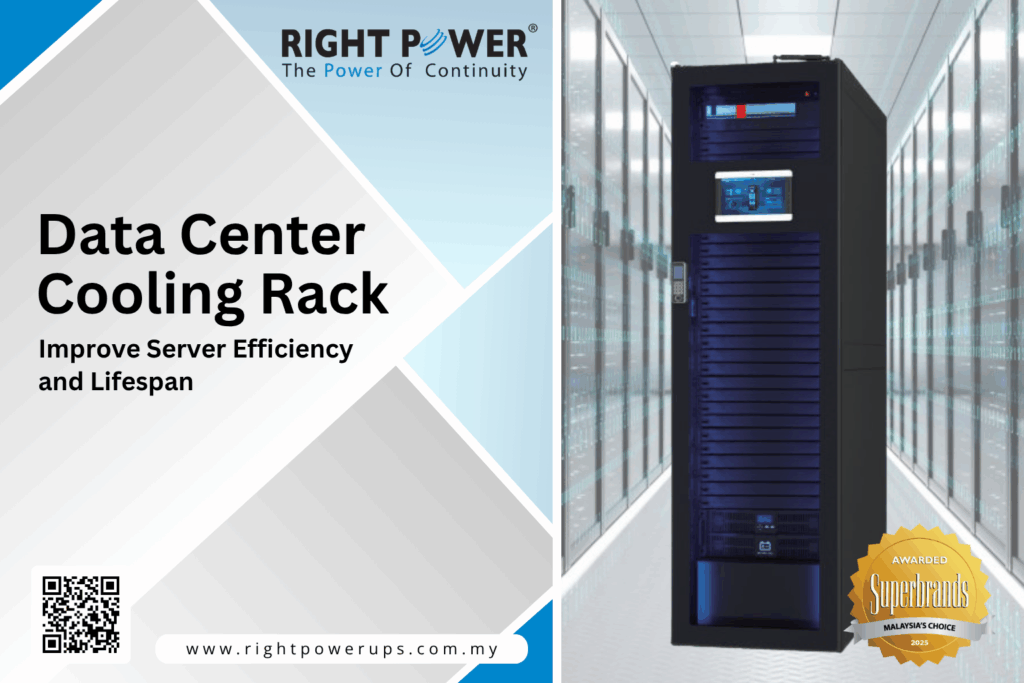Nowadays, businesses rely on data centers than ever before to keep their business running. From finance to online shopping, any minute of downtime could run into thousands of dollars. This is why the right equipment is so important not only the data center cooling system, but the data center UPS system as well.
Right Power Technology is among the best data center cooling system suppliers in Malaysia. We understand that both power and temperature must be kept as much as possible. In this blog here, we are going to explain in more detail how a bad cooling system can damage your UPS system and how you should avoid it.
What Is Data Center Cooling System?
A data center cooling system has to manage the heat produced by servers and devices. Every server, storage device, or switch in a data center produces heat. Multiply that by dozens or even hundreds of units, and the heat gets completely out of control.
Without proper cooling, the room temperature will rise above safe operating temperatures. When that happens, equipment begins to overheat, and that creates performance issues and hardware failure.
What Is Data Center UPS System?
Data center UPS system (Uninterruptible Power Supply) is the backup power solution that protects data and equipment when there’s a sudden power outage or voltage issue. It ensures your servers don’t crash, data isn’t lost, and operations stay running while the main power is being restored.
A UPS system includes batteries, power modules, and control systems. These components are sensitive to heat, just like servers. That’s why a good cooling system is just as important for your UPS as it is for your servers.
The Connection Between Data Center Cooling and UPS Systems
Many people think the cooling system is only for servers. But in reality, the data center UPS system also depends on it. UPS batteries and modules can overheat easily if not kept at a stable temperature. When they do, they degrade faster, fail suddenly, or even become a fire risk.
If your cooling system is weak or fails, the UPS system may not work when you need it most.
Let’s break it down further:
1. Heat Reduces Battery Life
Most UPS systems use batteries either lead-acid or lithium-ion. If your data center is too hot, you might end up replacing your UPS batteries more often than needed, costing more money in the long run.
2. Overheating Causes UPS Shutdowns
Many modern UPS systems have a built-in safety feature that shuts down the unit when it gets too hot. If your data center cooling system doesn’t work properly, the UPS might shut itself down when you need it the most during a power outage.
3. Risk of Explosion
In some UPS systems, especially those with batteries, too much heat can lead to a dangerous event called “thermal runaway.” Without a data center cooling system to remove the heat, this can lead to battery swelling, leaking, or even fire.
Why is Efficient Data Center Cooling Needed?
A data center cooling system helps remove hot air and circulate cool air to protect servers from heat-related damage. These air cooling systems prevent circuit boards from overheating and failing. Key reasons for having an effective data center cooling system include:
- Equipment Protection: Most of the devices, wiring, and components in a data center ups system will be damaged when exposed to high temperature and humidity.
- Performance Optimization: Data center cooling system also helps devices run faster without overheating. Without air conditioning, servers can be slowed down by the heat.
- Safety: Naturally, overheating of servers also poses the risk of fire and destruction of a data center. Cooling ensures safe, reliable, and protected server rooms at all times.
- Operational Costs: Without sufficient cooling systems in place, equipment is more likely to be damaged and need frequent repairs and replacements. Cooling the air keeps operational expenses and maintenance to a minimum.
How to Protect Your UPS System with Right Cooling Setup
If you want your data center UPS system to last longer and work better, your cooling setup needs to be a top priority. Here are some simple steps to protect both systems:
1. Keep the Data Center Cooling Room Temperature Stable
Make sure the environment where your UPS is located stays between 20°C and 25°C (68°F–77°F). Use temperature sensors to monitor hot spots and adjust cooling accordingly.
2. Use Rack Cooling Unit
Rack cooling unit is one of the precision cooling systems, like in-row coolers or rack-based coolers, can directly target heat near your UPS system and server racks. This keeps air movement efficient and avoids overheating.
3. Install Environmental Monitoring
Installing sensors for temperature, humidity, and airflow. These tools can alert your team if the UPS area gets too hot before a shutdown happens.
4. Follow Regular Maintenance Schedule
Make sure air filters are cleaned, vents are clear, and cooling systems are inspected at least every quarter. This keeps airflow strong and reliable.
5. Separate Heat Zones
High-heat equipment like servers should be isolated from sensitive systems like UPS units. You can use hot and cold aisle layouts or partitions to control where the air flows.
Conclusion
It’s easy to forget how important temperature is until something goes wrong. But when a poor data center cooling system causes a data center UPS system to fail, the results can be costly both in money and data loss.
By making cooling a top priority and working with experts like Right Power Technology, you can avoid overheating risks, extend the life of your UPS batteries, and make sure your systems stay online when it matters most.
Whether you’re building a new data center or upgrading an old one, don’t overlook the cooling system. It’s not just about comfort but it’s about survival.
Find more about:


